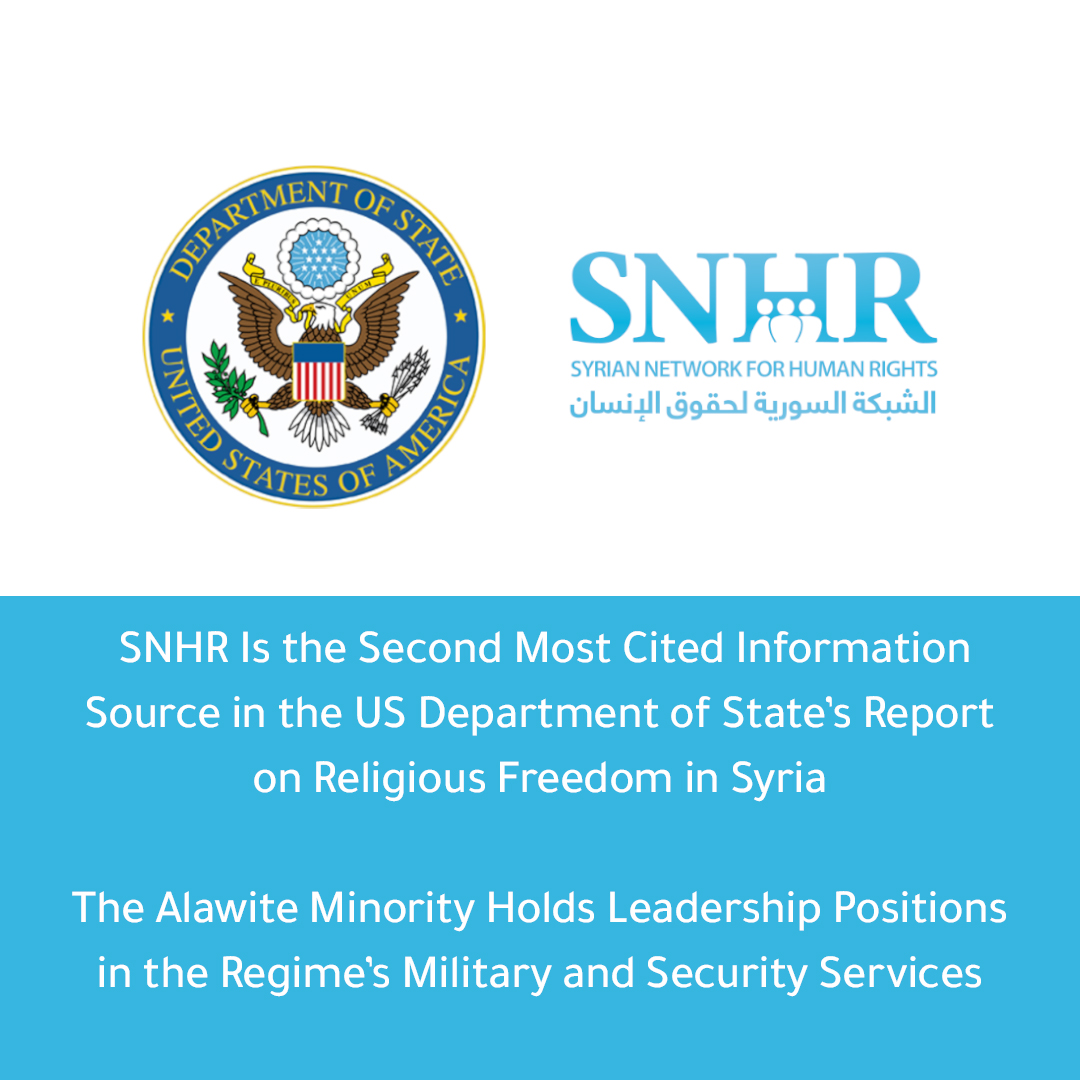The Alawite Minority Holds Leadership Positions in the Regime’s Military and Security Services

Languages
Available In
The US Department of State’s Bureau of Democracy, Human Rights, and Labor’s recently issued its annual report for 2021 on International Religious Freedom in Syria notes that sectarian violence has continued across the country, exacerbated by the Syrian regime’s actions, with the destruction of infrastructure and the targeting of individuals carried out on a sectarian basis by the Syrian regime and other parties to the conflict.
The report relies on several sources, most notably, in order of the number of quotes included:
The Independent International Commission of Inquiry (COI): 11 quotes.
The Syrian Network for Human Rights (SNHR): Eight quotes.
The report also cites other sources such as United Nations High Commissioner for Refugees (UNHCR), and the Middle East Institute.
The report states that sectarian violence has continued due to tensions among religious groups which are exacerbated by government actions, the deterioration of the Syrian economy, and the broader ongoing conflict in the country, explaining that the Syrian regime’s government, with the support of its Russian and Iranian allies, has continued to commit human rights abuses and violations against its opponents, the majority of whom are Sunni Muslims, as well as perpetrating widespread destruction of places of worship, hospitals, homes, and other civilian infrastructure components.
The report reveals that more than half of the country’s prewar population has now been displaced, either as internally displaced persons (IDPs) or as refugees, adding that the Syrian regime has continued to use Law No. 10, which allows the creation of redevelopment zones across the country designated for reconstruction, with these contracts rewarded to those loyal to the government, and has created obstacles for refugees and IDPs wishing to reclaim their property or return to their homes.
The report further notes that while the majority of the Syrian population is Sunni Muslim, the Alawi minority continues to hold an elevated political status disproportionate to its numbers, particularly in leadership positions in the military and security services. The report adds that sectarianism and the advancement of the Alawite minority have become more entrenched, disenfranchising non-Alawite Muslims, as well as Christians, Druze, and members of other religious minority groups.
As the report further notes, the Iranian government has directly supported the Assad government primarily through the Islamic Revolutionary Guard Corps, recruiting Iraqi, Afghan, and Pakistani Shia fighters to join the conflict.
The report additionally states that some Turkish-supported Syrian armed opposition groups have committed abuses that may have amounted to war crimes, including torture, rape, hostage-taking, looting, and appropriating private property, particularly in Kurdish areas, as well as vandalizing Yezidi religious sites in areas under their control.
The report notes that on September 24, 2021, Michelle Bachelet, the UN High Commissioner for Human Rights, told the UN Human Rights Council that from March 2011 to March 2021, more than 350,000 identifiable individuals had been killed in the course of the conflict in the country. The commissioner noted that the figure indicates “a minimum verifiable number,” and that it is “certainly an under-count of the actual number of killings.”
The report also notes that the SNHR documented at least 1,279 attacks on mosques in the country between March 2011 and November 2021, attributing 914 of these attacks to the Syrian regime and 204 others to Russian forces. The SNHR also documented at least 126 attacks on Christian places of worship during the same time period, attributing 76 of these attacks to the regime, 33 to armed opposition factions, 10 to ISIS, five to other parties, and two to Hay’at Tahrir al Sham.
The report adds that although ISIS no longer has control of significant territory, the fate of 8,648 individuals documented by SNHR as having been detained by ISIS since 2014 remains unknown.
In conclusion, the report states that the US President has stressed the need for a political solution to the conflict in Syria in line with UN Security Council Resolution 2254, which states that such a solution should establish credible, inclusive, and non-sectarian governance.
The report notes that the United States of America continues to support the documentation, analysis, and preservation of evidence of abuses committed by all parties in the conflict, including those committed against religious minorities, through the COI and the International Impartial and Independent Mechanism for Syria (IIIM), as well as through direct support for the documentation efforts carried out by Syrian human rights organizations.
The SNHR stresses its willingness to contribute to all international reports on the human rights situation in Syria, and will continue to make the greatest possible effort to provide any data and information required of it in this regard, in order to report the ongoing violations and incidents objectively and credibly to achieve the goal of protecting civilians in Syria, holding all perpetrators accountable, and helping to start the country along the path of positive change towards democracy.
To read the US Department of State’s full report issued on Thursday, June 2, 2022, please download it via this link.


